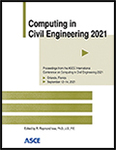Social Network Analysis of Multisector Stakeholder Collaboration and Engagement in Housing Resilience Planning
Publication: Computing in Civil Engineering 2021
ABSTRACT
Housing resilience planning is a dynamic process that involves multisector stakeholders, including public agencies, private industries, nongovernment organizations (NGOs), academia, and community residents. Despite the importance of multisector stakeholder collaboration, there is limited understanding of stakeholder collaboration in housing resilience planning. To address this gap, this study analyzes how multisector stakeholders collaborate in producing housing resilience-focused plans, reports, and guidelines utilizing social network analysis (SNA). A two-mode, stakeholder-document, SNA model was built based on secondary data collected from 39 documents on housing resilience in three regions, including the City of Miami, the City of Miami Beach, and Miami-Dade County. The network analysis shows that there are significant differences in network measures across different stakeholder sectors. The findings from this study could offer insights on how to facilitate more effective and collaborative housing resilience planning.
Get full access to this chapter
View all available purchase options and get full access to this chapter.
REFERENCES
Fan, C., Jiang, Y., and Mostafavi, A. (2020). Integrated Natural Language Processing and Meta-Network Analysis for Social Sensing of Location-Event-Actor Nexus in Disasters, Proc. of 2020 Construction Research Congress, ASCE, Reston, VA., 622–631.
Freeman, L. C. (1978). Centrality in social networks conceptual clarification. Social Networks, 1(3), 215–239.
Gan, X., Chang, R., and Wen, T. (2018). Overcoming barriers to off-site construction through engaging stakeholders: A two-mode social network analysis. J. Cleaner Production, 201, 735–747.
Horvath, S. (2011). Weighted Network Analysis: Applications in Genomics and Systems Biology, Springer, New York.
Kapucu, N., and Garayev, V. (2011). Collaborative Decision-Making in Emergency and Disaster Management. Int. J. Public Administration, 34(6), 366–375.
Laerd Statistics. (2021). Laerd Statistics. <https://statistics.laerd.com/>(Mar. 10, 2020).
Newman, M. E. J. (2008). Mathematics of Networks. The New Palgrave Dictionary of Economics, Palgrave Macmillan, London, UK, 1–8.
Pathak, A., Zhang, L., and Ganapati, N. E. (2020). Understanding Multisector Stakeholder Value Dynamics in Hurricane Michael: Toward Collaborative Decision-Making in Disaster Contexts. Natural Hazards Review, 21(3), 04020032.
Provan, K. G., and Kenis, P. (2008). Modes of network governance: Structure, management, and effectiveness. Journal of public administration research and theory, 18(2), 229–252.
Pyke, J., Law, A., Jiang, M., and de Lacy, T. (2018). Learning from the locals: the role of stakeholder engagement in building tourism and community resilience. J. Ecotourism, 17(3), 206–219.
Raadschelders, J. C., and Whetsell, T. A. (2018). Conceptualizing the landscape of decision making for complex problem solving. Int. J. Public Administration, 41(14), 1132–1144.
Rahill, G. J., Ganapati, N. E., Clérismé, J. C., and Mukherji, A. (2014). Shelter recovery in urban Haiti after the earthquake: the dual role of social capital. Disasters, 38(s1), S73–S93.
Rouhanizadeh, B., and Kermanshachi, S. (2019). Investigating the Relationships of Socioeconomic Factors Delaying Post-Disaster Reconstruction. Proc., 2019 ASCE Int. Confer. Comput. in Civil Eng., ASCE, Reston, VA, 33–40.
Sadri, A. M., Ukkusuri, S. V., and Gladwin, H. (2017). The Role of Social Networks and Information Sources on Hurricane Evacuation Decision Making. Natural Hazards Review, 18(3), 04017005.
Taeby, M., and Zhang, L. (2019). Exploring Stakeholder Views on Disaster Resilience Practices of Residential Communities in South Florida. Natural Hazards Review, 20(1), 04018028.
GM&B (The Greater Miami and the Beaches). (2019). Resilient305 Strategy. <https://resilient305.com/wp-content/uploads/2019/05/Full-Strategy-2.pdf>.
UNISDR (United Nations Office for Disaster Risk Reduction). (2012). Annual report 2011: UNISDR secretariat Work Programme 2010–201, UNISDR, Geneva, Switzerland.
Vechan, E., El-Adaway, I., and Hassan, M. (2014). Dynamic Social Network Analysis for Infrastructure Transportation Systems. Proc., 2014 Construction Research Congress, ASCE, Reston, VA, 1179–1188.
Zhang, L., Lv, X., and Dhakal, S. (2019). A reinforcement learning-based stakeholder value aggregation model for collaborative decision making on disaster resilience. Proc., 2019 ASCE Int. Confer. Comput. in Civil Eng. ASCE, Reston, VA, 490–497.
Information & Authors
Information
Published In
History
Published online: May 24, 2022
Authors
Metrics & Citations
Metrics
Citations
Download citation
If you have the appropriate software installed, you can download article citation data to the citation manager of your choice. Simply select your manager software from the list below and click Download.
